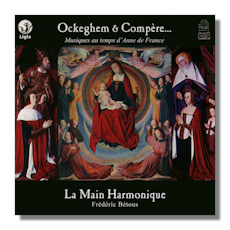
The Internet's Premier Classical Music Source
Related Links
-
Ockeghem Reviews
Compère Reviews
Agricola Reviews - Latest Reviews
- More Reviews
-
By Composer
-
Collections
DVD & Blu-ray
Books
Concert Reviews
Articles/Interviews
Software
Audio
Search Amazon
Recommended Links
Site News
 CD Review
CD Review
Musique au temps d'Anne de France

- Johannes Ockeghem:
- S'elle m'amera/Petite camusette
- Aultre Venus
- Mort, tu as navré de ton dart
- La despourveue
- Presque transi
- Permanente vierge
- Loyset Compère:
- Vous me faites morir
- Pensant au Bien
- Plaine d'ennuy/Anima mea
- Alexander Agricola:
- Belles sur toutes/Tota pulchra es
- Je n'ay dueul
- Johannes Ghiselin Verbonnet (fl. 1491-1507): O florens rosa
La Main Harmonique/Frédéric Bétous
Ligia Lidi0202217-10
La Main Harmonique was founded to promote mediaeval and Renaissance music. The term refers to a mnemonic device which takes its name from the early theoretician, Guido d'Arezzo. One starts by feeling encouraged that yet another small, independent, group is dedicated to furthering polyphonic and solo music from the period. It doesn't take very long for that encouragement to be justified. Theirs is singing of great poise, delicacy and precision as they work their way sensitively through small-scale works from the courts of the Château de Moulins and Duke of Bourbon during the reigns of Anne and Pierre II of Beaujeu in the later fifteenth century. This was a cultural environment which saw a huge flowering of patronage, invention and coming together of poets and composers, producing a true trove of music that's already widely recorded, to be sure. Though with performances accomplished with the degree of gentility and meticulousness as exhibited by La Main Harmonique on this Ligia CD, there's always room for more. In fact, not all of the works here presented have been recorded previously.
The music is chiefly by Flemish composers, Johannes Ockeghem (1410/1425-1497) and Loyset Compère (c.1445-1518) with a couple of works from their contemporaries, Alexander Agricola (1445/1446-1506) and Johannes Ghiselin-Verbonnet (fl. 1491-1507). In their evenly-paced and somewhat introspective accounts, La Main Harmonique not only point up some of the defining characteristics of each of those composers, but thereby also provide contrast between them – and an according freshness. Ghiselin-Verbonnet's O florens rosa [tr.6], for example, has trickling instrumental accompaniments; the very next item, the celebrated Mort, tu as navré de ton dart, the longest item on the disk at nine minutes, is even and unwinds slowly with what at first seems mere ambulatory articulation. In fact, La Main Harmonique conveys its dignity, regret and concentrated sense of loss clearly and with real passion.
Yet the group has nothing of the dolorous about their music making. Certainly not maudlin. Their approach may be gentle and considered. But there's no lack of life in either singing or accompaniment. They have entered into the spirit of the music and embraced its idiom very well indeed: this is the era of Villon, after all. The techniques include the celebrated multi-textual songs or double chansons. There is, in their cases, a richness and extra interest in the complexity which, to us, may seem a very modern way of setting words. The Ballades, Virelais and Rondos were losing currency at this time, as was what seems like an obsession to us, perhaps, with courtly love. La Main Harmonique on the one hand manages to exploit these conventions to communicate the textual essence throughout – listen to the fragility of:
Je n'ay dueil que de vos ne viengne,
Mais quelque mal que je soustiengne,
J'ay trop plus che vivre en doulour
Que souffrir que mon povre cueur
A ung aultre qu'a vous se tiengne.
in Agricola's Je n'ay dueul [tr.9]. On the other, their consistency of vocal line and dynamic suggests a universality that reaches way beyond these conventions. It's only barely fanciful to remember that Anne of France's encouragement of interplay between the individual creator and his/her responsibilities to the community, and thus see reflections between the filigree achieved by La Main Harmonique in these performances and such presumed interactivity at that time.
It has to be said, though, that there is nothing either precious or self-conscious about the approach which La Main Harmonique takes. It's a wholehearted and confident one with nothing "held back" in any way. At the same time, their interpretative skills combine to hide nothing; it's the music, not the performance, with which you are left. A great achievement and promising start for the ensemble, which comprises five singers, including counter-tenor and director Frédéric Bétous, and four instrumentalists playing vielles, flutes and lute.
The acoustic is close yet generous and highly appropriate for the music. The liner booklet contains much historical background, some nice color photographs of the performers and the texts in French only. Lovers of song of the period will want this CD for the contribution it makes to the repertoire, and the pieces otherwise unavailable. Those who appreciate very finely attuned singing in its own right should not hesitate either.
Copyright © 2011, Mark Sealey.





















